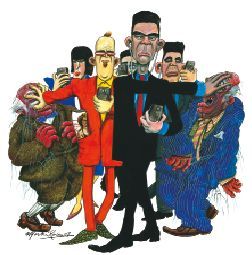The Spectator political commentator Henry Fairlie, in his column of 23 September 1955, famously identified the Establishment as the mechanism through which power was exercised in this country. His analysis, though at once recognised as authentic, was written as the British Establishment was about to collapse. Today it enjoys some residual notoriety (manifest through former ruling-class institutions such as White’s Club) but no political significance.
Though the eclipse of the Establishment is well-documented, the Political Class which replaced it is so far poorly understood. This is regrettable because the Political Class has come to occupy the same public space that the Establishment was supposed to until the end of the 20th century. This new class now stands at the pinnacle of the British social and economic structure. It sets social conventions, and demarcates the boundaries against which both public and private behaviour are defined. Unlike the old Establishment, the Political Class depends directly or indirectly on the state for its special privileges, career structure and increasingly for its financial support. This visceral connection distinguishes it from all previous British governing elites, which were connected much more closely to civil society and were frequently hostile or indifferent to central government. Until recent times members of British ruling elites owed their status to the position they occupied outside Westminster. Today, in an important reversal, it is the position they occupy in Westminster that grants them their status in civil society.
The Political Class is distinguished from earlier governing elites by a lack of experience of and connection with other ways of life. Its members make government their exclusive study. This means they tend not to have significant knowledge of industry, commerce, or civil society, meaning their outlook is often metropolitan and London-based. This converts them into a separate, privileged elite, isolated from the aspirations and the problems of provincial, rural and suburban Britain.







Comments
Join the debate for just £1 a month
Be part of the conversation with other Spectator readers by getting your first three months for £3.
UNLOCK ACCESS Just £1 a monthAlready a subscriber? Log in